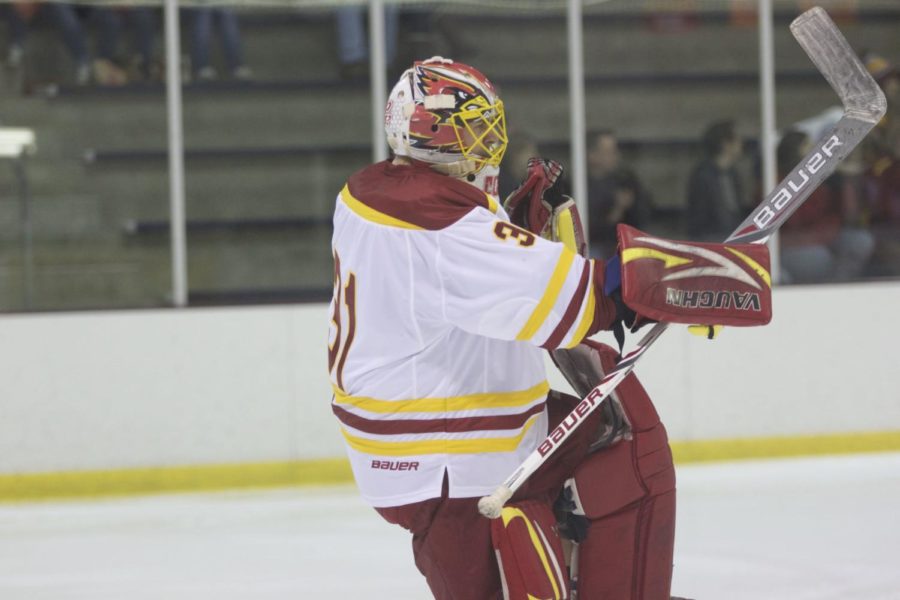Two times the hardware: Matt Cooper notches second all-American honor
Senior goalie Matt Cooper fist pumps and celebrates after his team scores a goal against Colorado State on Nov. 22. ISU defeated Colorado State with a final score of 5-2.
May 13, 2015
When Cyclone Hockey head coach Jason Fairman heard the news that his starting goaltender for two-plus years, Matt Cooper, had been named the goaltender for the all-American third team in the American Collegiate Hockey Association for the 2014-15 season, he was shocked — and not in the way some might think.
“My first response was of disappointment,” Fairman said. “I thought he was going to be first team all-American. His statistics are exactly the same except for his win/loss. There’s a lot of great goalies in the country and I don’t want to take anything away from them, but I’m just looking out for my player.”
For the 2013-14 season, Cooper was awarded first-team all-American honors in the American Collegiate Hockey Association, his first year as the everyday netminder.
Cooper’s stats show he could have been in the discussion of that first-team honor this season as well. The senior put up a top-10 2.05 goals against average, which bested his previous year’s average of 2.06. His save percentage of 92.7 was just a few ticks shy of his 2013 percentage of 93.3.
He played 1,846:45 minutes in net, good for second best in the league and 818 saves — second as well.
Who was first in both of those statistics? The pick for first team all-American — Rhode Island goaltender, Andrew Sherman.
But that doesn’t bother Cooper because he knows Sherman’s level of talent.
“[Sherman] is an outstanding goalie,” Cooper said with clear admiration. “As far as I could tell, he is the only reason Rhode Island had been doing so well the last few years. They aren’t typically a huge Division I ACHA hockey program and he really did some great things. Seeing him first hand you see the level of talent he plays at. He is fully deserved.”
Cooper’s season was a long one, not just in games played, but in miles traveled. He was selected for the second time to the USA hockey team for the Winter World University Games in Granada, Spain in early February and started in the majority of games in USA’s seventh-place finish.
Cooper came back to the Cyclones when they were gearing up for a playoff run in the Central States Collegiate Hockey League and ACHA tournaments.
During that playoff run where the team took a first-round exit in the CSCHL tournament, Cooper saved 28 of Illinois’ 30 shots in the 2-1 loss.
He was just as stellar in the ACHA tournament, saving 42 of the 43 shots he faced in the first-round Cyclone win against Oklahoma. He did much of the same against eventual-national champion Central Oklahoma in the quarterfinal, stopping 40 of 44 shots in the 5-3 loss.
It certainly was a long stretch for the veteran goaltender but one Cooper enjoyed.
“I enjoyed [the stretch],” he said. “I enjoy playing hockey and I love being the guy and playing the best hockey I can. To be able to have [the World University Games] experience and bring it back to use it with the guys during the playoffs. I think I did that.”
What he did for the Cyclones psychologically was just as profound as what he did on paper.
“He just gave us a chance to win, game in and game out,” Fairman said. “I think there was a psychological edge against our opponents when they were playing against [Cooper] because he had a reputation nationally.”
As for his future plans, Cooper wants a career in the game and has even thought about playing professionally somewhere along with a plan in the business field. But for now, the goalie just wants to reminisce and relax after a long but fun three years with Cyclone Hockey.
“I honestly wish that I had come sooner,” Cooper said of his transfer from Hamline after two seasons and coming to Cyclone Hockey for three more. “Looking back on it, [Iowa State] was a great school and gave me more than I ever imagined in my hockey career and in my future business career. You can’t ask any more from a program.”







